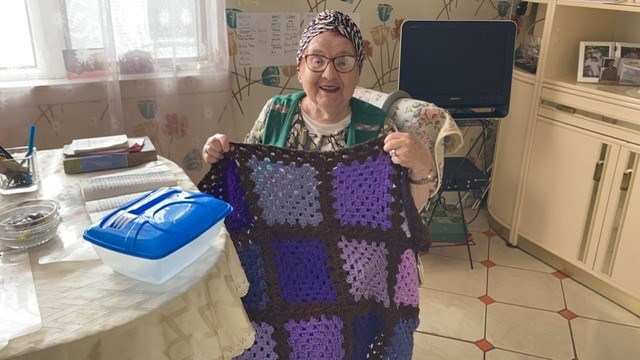According to the New York City Department for the Aging (DFTA), Brooklyn's senior population is steadily growing. As of the latest census data, over 700,000 people in Brooklyn are 60 and older, and the number will continue to rise. The good news is that people are living longer, and there are abundant, affordable, accessible and diverse senior care resources within Brooklyn, allowing seniors to age in place in the comfort of their homes and local communities.
As advocates for older adults, caregivers set the tone for a healthy strategy that provides their older loved one a sense of independence. The first step is to listen to them! In my work, I often speak with adult children who tell me, "I don't know how to help my parent(s). What should I do?" I typically reply, "Well, have you asked them what they want? Do you know what's important to them to live the best quality life?" It never surprises me that most individuals skip this step. Seniors are resilient and know what they want and need. Start at the source, and then you can map out the necessary resources and begin your research.
Now, let's step back and address the elephant in the room. Caring for an older adult can evoke various emotions and feelings, including fulfillment, gratification, stress, loneliness, and emotional and physical exhaustion. More than anything, caregivers often have issues maintaining balance in their lives. AARP's research notes that nearly 70% of family caregivers struggle to manage their jobs alongside caregiving duties, usually leading to reduced work hours, declining promotions, or leaving the workforce entirely. A reduction in the workforce can also lead to substantial economic losses – so the impact goes beyond the four walls of your home.
With that said, caregivers don't need to stop working. It's like the old saying, "Work smarter, not harder." Many potential caregivers fear they will serve in a full-time role, which may not be necessary with the proper resources at play.
Here are a few resource-related tips caregivers can keep in mind to alleviate burden and empower an older adult in their lives:
- Look for resources (everywhere). Senior centers and religious and spiritual places of worship provide many unique offerings and programs. There is also robust information and guidance from state and community-based organizations like NYC 311, the NYC Department for the Aging, and AARP New York. Overall, there is increased funding for senior services in Brooklyn. The 2023 city budget allocated substantial investments for senior programs to aid in expanding meal programs, transportation, and social services. All you have to do is look!
- Create an out-of-the-box approach. Seniors' needs range from socialization to mental health support, transportation, and more. Again, knowing what's important to an older adult in your life is essential. It will allow you to approach their day-to-day needs with an organized and customized plan that gives them access to adequate resources. A weekly plan may include visiting a local senior center (there are over 50 in Brooklyn), signing up for a food delivery service or participating in one of the Brooklyn Public Library's senior-focused programs. The options are endless and range from necessity to entertainment.
- Embrace digital platforms. Digital platforms support communication with loved ones, provide access to virtual groups, and allow easy telehealth visits. According to a 2021 analysis by the Health Affairs Journal, telehealth can reduce healthcare costs for seniors by decreasing the need for in-person visits and hospital admissions. It's estimated that telehealth services could also save up to $1,500 per patient annually in healthcare costs.
- Keep an open line of communication. Educate yourself and the senior's extended support circle. You are responsible for advocating for your loved ones and know them more than anyone else. It's a lot of responsibility, but communication is key. Be sure to discuss the senior's ongoing plan with others in their support circle who may play a role in their life. It's essential for everyone to be working toward the same goal and remain on the same page. Consider a weekly check in call or text to confirm details, upcoming scheduling, etc.
- Develop a backup plan. Sometimes, things don't work out – caregivers can't control everything. Have a plan to ensure your loved one has access to ongoing resources through thoughtful planning and troubleshooting. In addition, New York's Paid Family Leave allows caregivers to take time off work to care for a family member with a severe health condition. Keep this in mind as circumstances change and caregiving plans need to quickly shift.
Remember to fill your cup. Caregiving is one of the most important things you can do on this earth. Most likely, you are a caregiver because you want to show up and support someone you care about. Sometimes, it will feel like a thankless job; other times, your heart will burst at the seams with gratitude. Of note, nearly 40% of caregivers report experiencing high levels of stress and burnout, according to a 2022 survey by the National Alliance for Caregiving and AARP. Remember to fill your cup and take the time to do things that bring you joy, so you can be there to support and advocate for the older adult in your life.
Harriet Blank is the director of older adult services at Ohel Children's Home and Family Services. She leads several related programs, including the organization’s new HUB at Home, which supports homebound seniors 60+ and their caregivers throughout Flatbush, Midwood, Borough Park and Kensington with free case management including psychology treatment, entitlements, home care, meals on wheels and visiting services. Visit https://www.ohelfamily.org/service/older-adult-services to learn more.




